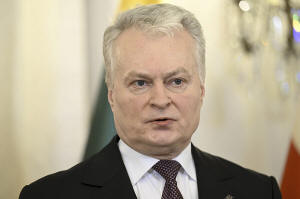Lithuania vows to boost defense spending to 5-6% of GDP, citing the
threat of Russian aggression
 Send a link to a friend
Send a link to a friend
 [January 17, 2025]
By LIUDAS DAPKUS [January 17, 2025]
By LIUDAS DAPKUS
VILNIUS, Lithuania (AP) — Lithuania has decided to raise its spending on
defense to between 5% and 6% of overall national economic output
starting in 2026 due to the threat of Russian aggression in the region,
Lithuanian President Gitanas Nausėda said Friday.
The Baltic nation, which borders Russia, currently spends a bit over 3%.
With the president's pledge, it becomes the first NATO nation to vow to
reach a 5% goal recently called for by U.S. President-elect Donald
Trump.
Nausėda said the “historic decision” was taken by the State Defense
Council on Friday to achieve that level from 2026 to 2030.
Reaching that goal would make Lithuania the NATO country spending the
most on defense as a percentage of its economic output. The current
leader is Poland, which already spends more than 4% and plans to go
higher.
“The possibility of Russian military aggression is still real, but not
imminent. We need to increase our efforts to strengthen defense and
deterrence significantly, devoting more resources to this end," Nausėda
told reporters after the meeting in the Lithuanian capital, Vilnius.
Trump has for years expressed skepticism about NATO, openly questioning
the value of the alliance that has defined American foreign policy for
decades and threatening not to defend members that fail to meet
defense-spending goals.

Earlier this month, Trump said NATO countries should spend at least 5%
of GDP on defense, up from the current 2% target. He also said he would
not rule out the use of military force to seize control of Greenland, an
autonomous territory belonging to NATO member Denmark.
“Our security is also assured by our membership in the NATO alliance,
but it will only be effective if we are prepared to defend ourselves,”
Nausėda said.
Speaking at the news conference alongside the president, Defense
Minister Dovilė Šakalienė said the additional financing would go toward
advance payments on Leopard tanks, air defense systems and other
equipment, which will help to accelerate deliveries.
[to top of second column]
|

The President of Lithuania, Gitanas Nauseda, gives a statement ahead
of a summit of the Baltic Sea NATO countries in Helsinki, Finland,
Tuesday, Jan. 14, 2025. (Antti Aimo-Koivisto/Lehtikuva via AP)

Šakalienė is part of a new center-left government that took office
last year vowing to make security a key priority for the nation of
just under 3 million people. In one of its early moves last month it
increased the state's international borrowing limit in order to be
able to borrow the money for defense investments.
There has been a mixed reaction from European NATO leaders to
Trump's call to massively raise investments on defense, with some
stressing the difficulty of spending so much on defense, while
others — particularly those on NATO's eastern front who feel most
vulnerable — are embracing the idea.
Some in this region feel that, despite the costs, enhanced
deterrence now would still be far less costly than facing Russian
aggression later.
Margarita Šešelgytė, the director of the Institute of International
Relations and Political Science in Vilnius, argues that increased
defense spending is needed because Russia shows no sign of relenting
in its nearly three-year war in Ukraine.
“We are a front-line state and should act like one. The war is
ongoing and Russia’s military production is functioning at full
capacity," she said in an interview this week with The Associated
Press. “The new administration in the U.S. adds uncertainty to the
future situation in Ukraine. America is losing its appetite to be
present here, so we need to speed up investments in our security.”
She acknowledges that financing the purchases of weapons and other
investments raises the question of where that money should comes
from, and undoubtedly “would stress the budget significantly.”
Because of Lithuania's recent economic growth, it is an strong
position to borrow internationally. Still, she said, “the economy of
a democratic country cannot function in such a regime for long
periods, but right now we need a burst of initiatives and
investments."
All contents © copyright 2025 Associated Press. All rights reserved |